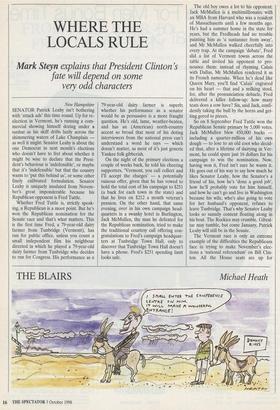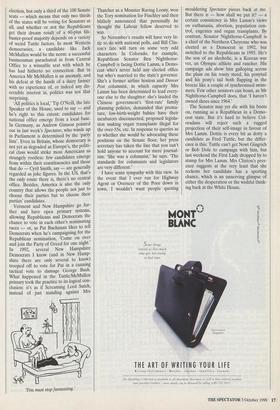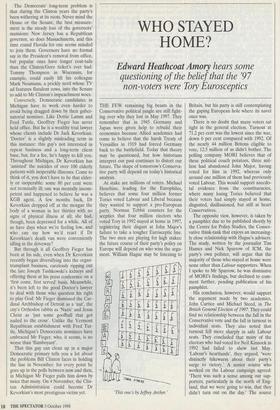WHERE THE LOCALS RULE
New Hampshire SENATOR Patrick Leahy isn't bothering with 'attack ads' this time round. Up for re- election in Vermont, he's running a com- mercial showing himself dozing under a sunhat as his skiff drifts lazily across the shimmering waters of Lake Champlain as well it might: Senator Leahy is about the one Democrat in next month's elections who doesn't have to fret about .whether it might be wise to declare that the Presi- dent's behaviour is 'indefensible', or maybe that it's 'indefensible' but that the country wants to 'put this behind us', or some other finely calibrated formulation. Senator Leahy is uniquely insulated from Novem- ber's great imponderable because his Republican opponent is Fred Tuttle.
Whether Fred Tuttle is, strictly speak- ing, a Republican is a moot point. But he's won the Republican nomination for the Senate race and that's what matters. This is the first time Fred, a 79-year-old dairy farmer from Tunbridge (Vermont), has run for public office, unless you count a small independent film his neighbour directed in which he played a 79-year-old dairy farmer from Tunbridge who decides to run for Congress. His performance as a 79-year-old dairy farmer is superb; whether his performance as a senator would be as persuasive is a more fraught question. He's old, lame, weather-beaten, and has an (American) north-country accent so broad that most of his doting interviewers from the national press can't understand a word he says — which doesn't matter, as most of it's just generic Yankee folk gibberish.
On the night of the primary elections a couple of weeks back, he told his cheering supporters, 'Vermont, you call collect and I'll accept the charges' — a potentially ruinous offer, given that he has vowed to hold the total cost of his campaign to $251 (a buck for each town in the state) and that he lives on $212 a month veteran's pension. On the other hand, that same evening, over in his own campaign head- quarters in a swanky hotel in Burlington, Jack McMullen, the man he defeated for the Republican nomination, tried to make the traditional courtesy call offering con- gratulations to Fred's campaign headquar- ters at Tunbridge Town Hall, only to discover that Tunbridge Town Hall doesn't have a phone. Fred's $251 spending limit looks safe. The old boy owes a lot to his opponent: Jack McMullen is a multimillionaire with an MBA from Harvard who was a resident of Massachusetts until a few months ago. He's had a summer home in the state for years, but the Fredheads had no trouble painting him as 'a suntanner from away', and Mr McMullen walked cheerfully into every trap. At the campaign 'debate', Fred slid a list of Vermont towns across the table and invited his opponent to pro- nounce them: instead of rhyming Calais with Dallas, Mr McMullen rendered it as its French namesake. When he's dead like Queen Mary, you'll find 'Calais' engraved on his heart — that and a milking stool, for, after the pronunciation debacle, Fred delivered a killer follow-up: how many teats does a cow have? Six, said Jack, confi- dently taking the bull by the horns and get- ting gored to pieces.
So on 8 September Fred Tuttle won the Republican Senate primary by 5,000 votes. Jack McMullen blew 450,000 bucks including a quarter-million of his own dough — to lose to an old coot who decid- ed that, after a lifetime of dairying in Ver- mont, he could spare just 16 dollars for his campaign to win the nomination. Now, having won it, Fred isn't sure he wants it. He goes out of his way to say how much he likes Senator Leahy, how the Senator's a friend of his, how he's 'done a good job', how he'll probably vote for him himself, and how he can't go and live in Washington because his wife, who's also going to vote for her husband's opponent, refuses to leave Tunbridge. That's why Senator Leahy looks so sunnily content floating along in his boat. The Rockies may crumble, Gibral- tar may tumble, but come January, Patrick Leahy will still be in the Senate.
The Vermont race is only an extreme example of the difficulties the Republicans face in trying to make November's elec- tions a 'national referendum' on Bill Clin- ton. All the House seats are up for election, but only a third of the 100 Senate seats — which means that only two thirds of the states will be voting for Senators at all, and whether or not the Republicans get their dream result of a 60-plus fili- buster-proof majority depends on a variety of weird Tuttle factors. In most Western democracies, a candidate like Jack McMullen would be the norm: a successful businessman parachuted in from Central Office to a winnable seat with which he has had hitherto no connection. But in America Mr McMullen is an anomaly, and his defeat at the hands of a dairy farmer with no experience of, or indeed any dis- cernible interest in, politics was not that surprising. `All politics is local,' Tip O'Neill, the late Speaker of the House, used to say — and he's right to this extent: candidates for national office emerge from a local base. In Germany, as Andrew Gimson pointed out in last week's Spectator, who winds up in Parliament is determined by the 'party lists'. Even in Britain, whose democracy is not yet as degraded as Europe's, the politi- cal class would strike most Americans as strangely rootless: few candidates emerge from within their constituencies and those that do — Cyril Smith, say — are generally regarded as joke figures. In the US, that's the only route there is, there's no central office. Besides, America is also the only country that allows the people not just to choose their parties but to choose their parties' candidates.
Vermont and New Hampshire go fur- ther and have open primary systems, allowing Republicans and Democrats the chance to vote in each other's nominating races — or, as Pat Buchanan likes to tell Democrats when he's campaigning for the Republican nomination, 'Come on over and join the Party of Greed for one night.' In 1992, several New Hampshire Democrats I know (and in New Hamp- shire there are only several to know) trooped off to vote for Pat in a cunning tactical vote to damage George Bush. What happened in the Tuttle/McMullen primary took the practice to its logical con- clusion: it's as if Screaming Lord Sutch, instead of just standing against Mrs You must stop fantasising.' Thatcher as a Monster Raving Loony, won the Tory nomination for Finchley and then blithely announced that personally he thought the Labour fellow deserved to win.
So November's results will have very lit- tle to do with national polls, and Bill Clin- ton's fate will turn on some very odd characters. In Colorado, for example, Republican Senator Ben Nighthorse- Campbell is facing Dottie Lamm, a Demo- crat who's never held any elected office but who's married to the state's governor. She's a former airline hostess and Denver Post columnist, in which capacity Mrs Lamm has been determined to lead every- one else to the slaughter: she's lauded the Chinese government's 'first-rate' family planning policies, demanded that prema- ture, low-birth-weight babies have their incubators disconnected, proposed legisla- tion making organ transplants illegal for the over-55s, etc. In response to queries as to whether she would be advocating these positions on the Senate floor, her press secretary has taken the line that you can't hold anyone to account for mere journal- ism. 'She was a columnist,' he says. The standards for columnists and legislators are very different.'
I have some sympathy with this view. In the event that I ever run for Highway Agent or Overseer of the Poor down in town, I wouldn't want people quoting mouldering Spectator pieces back at me. But there is — how shall we put it? — a certain consistency in Mrs Lamm's views on euthanasia, abortion, population con- trol, eugenics and organ transplants. By contrast, Senator Nighthorse-Campbell is a chief of the Northern Cheyenne who was elected as a Democrat in 1992, but switched to the Republicans in 1995. He's the son of an alcoholic, is a Korean war vet, an Olympic athlete and rancher. His campaign ads show him galloping across the plain on his trusty steed, his ponytail and his pony's tail both flapping in the breeze like a couple of synchronised swim- mers. Few other senators can boast, as Mr Nighthorse-Campbell does, that 'I haven't owned shoes since 1964.'
The Senator may yet die with his boots on, running as a Republican in a Demo- crat state. But it's hard to believe Col- oradans will reject such a rugged projection of their self-image in favour of Mrs Lamm. Dottie is every bit as dotty a candidate as Fred Tuttle, but the differ- ence is this: Tuttle can't get Newt Gingrich or Bob Dole to campaign with him, but last weekend the First Lady dropped by to stump for Mrs Lamm. Mrs Clinton's pres- ence suggests at the very least that she reckons her candidate has a sporting chance, which is an unnerving glimpse of either the desperation or the wishful think- ing back at the White House. The Democrats' long-term problem is that during the Clinton years the party's been withering at its roots. Never mind the House or the Senate, the best measure- ment is the steady loss of the governors' mansions: New Jersey has a Republican governor, so does Massachusetts, and this time round Florida for one seems minded to join them. Governors have no formal say in the President's removal from office, but popular ones have longer coat-tails than the Clinton/Gore ticket's ever had: Tommy Thompson in Wisconsin, for example, could easily lift his colleague Mark Neumann, a prickly nerd whose TV ad features flatulent cows, into the Senate to add to Mr Clinton's impeachment woes.
Conversely, Democratic candidates in Michigan have to work even harder to avoid being dragged down by their guber- natorial nominee. Like Dottie Lamm and Fred Tuttle, Geoffrey Fieger has never held office. But he is a wealthy trial lawyer whose clients include Dr Jack Kevorkian. `Doctor' is a slightly misleading term in this instance: this guy's not interested in repeat business and a long-term client base, but, for a fee, he's happy to kill you. Throughout Michigan, Dr Kevorkian has `assisted' the suicides of over 100 elderly patients with inoperable illnesses. Come to think of it, you don't have to be that elder- ly or inoperable: some 80 per cent were not terminally ill; one was mentally incom- petent and happened to believe he was a KGB agent. A few months back, Dr Kevorkian dropped off at the morgue the body of a woman in her thirties with no signs of physical illness at all; she had, though, been depressed for a while. All of us have days when we're feeling low, and who can say how we'd react if Dr Kevorkian's death van were conveniently idling in the driveway?
But through it all Geoffrey Fieger has been at his side, even when Dr Kevorkian recently began diversifying into the organ- transplant business, carelessly ripping out the late Joseph Tushkowski's kidneys and offering them at his press conference on a `first come, first served' basis. Meanwhile, it's been left to the good Doctor's lawyer to deal with those who question his right to play God: Mr Fieger dismissed the Car- dinal Archbishop of Detroit as a 'nut', the city's Orthodox rabbis as 'Nazis' and Jesus Christ as 'just some goofball that got nailed to the cross'. Unlike the Vermont Republican establishment with Fred Tut- tle, Michigan's Democratic nominees have embraced Mr Fieger, who, it seems, is no worse than 'flamboyant'.
That this guy can clean up in a major Democratic primary tells you a lot about the problems Bill Clinton faces in holding the line in November: for every point he goes up in the polls between now and then, in Michigan Mr Fieger pulls him down by twice that many. On 4 November, the Clin- ton Administration could become Dr Kevorkian's most prestigious victim yet.












































































 Previous page
Previous page